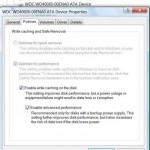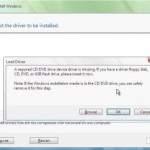After installing Windows Vista or Windows 7 on a SATA (Serial ATA) based hard disk drive (HDD) which is also a boot drive, if users attempt to change the Serial Advanced Technology Attachment (SATA) mode of the boot drive to use the Advanced Host Controller Interface (AHCI) specification, the following stop error will appear in the BSoD (Blue Screen of Death) screeen after users restart the computer.
STOP 0x0000007B INACCESSABLE_BOOT_DEVICE
Microsoft KB922976 explains that the cause for 00x0000007B error is due to AHCI driver (Msahci.sys) is disabled in Windows Vista or Windows 7 due to the default behavior of Windows to turn off all unused storage driver so that system will load faster. To use ACHI/SATA mode with Windows 7 or Windows Vista, Msahci.sys driver must be enabled before changing the SATA mode of the boot drive.
To resolve this issue, Windows 7 or Windows Vista users need to enable the AHCI driver in the registry before changing the SATA mode of the boot drive. To recover from the BSoD and able to use AHCI mode for SATA boot drive, use the following step-by-step guide:
- Restart the computer, and go into BIOS configuration menu.
- In the BIOS settings, change and revert back the SATA mode to original value, i.e. in ATA (or PATA) or IDE emulation mode). Doing this will allow system to get passed BSoD and boot up properly.
- Restart the computer to boot into Windows desktop.
- Exit all Windows-based programs.
- Click on Start Menu, type regedit in the Start Search box, and then press ENTER.
- If you receive the User Account Control dialog box, click Continue.
- Locate and then click the following registry subkey:
HKEY_LOCAL_MACHINE\System\CurrentControlSet\Services\Msahci
- In the right pane, right-click Start in the Name column, and then click Modify.
- In the Value data box, type 0, and then click OK.
- On the File menu, click Exit to close Registry Editor.
- Restart computer, and enable ACHI mode in BIOS again. This time the computer should be able to boot up properly without error or BSoD.






